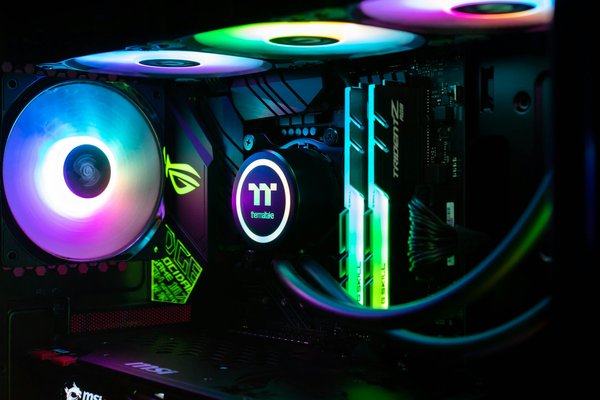Building your own
custom PC offers you unparalleled flexibility and performance. However, achieving an optimal balance between cooling and noise can be challenging. If you’ve chosen the
Corsair 4000D Airflow case, you’re already on track to excellent airflow and cooling. But how can you reduce
fan noise while maintaining top performance? Let’s dive into the best methods for achieving a quieter, yet efficient,
custom-built PC.
The Foundation: Choosing the Right Components
Before we delve into the specifics of fan noise reduction, it’s crucial to start with the right components. The
Corsair 4000D Airflow case provides an excellent foundation. Its design ensures efficient
airflow, which is key to maintaining low temperatures and reducing the need for high-speed, noisy fans.
Selecting Quiet Fans
The first step to minimizing fan noise is choosing the right
case fans. Opt for fans that are known for their quiet operation.
Corsair offers a range of
quiet fans designed to work with their
iCUE RGB systems. These fans are engineered to deliver excellent airflow without producing excessive noise.
- RGB Fans: Fans with RGB lighting can sometimes be quieter due to their advanced engineering.
- PWM Fans: Pulse-width modulation (PWM) fans allow for more precise control over fan speeds, leading to quieter operation.
- Fan Size: Larger fans tend to move more air at lower speeds, reducing noise levels.
Optimizing Fan Placement
Proper placement of your
case fans within the
tower case significantly impacts both
cooling and noise levels. The
Corsair 4000D Airflow case is designed to accommodate multiple fan configurations, which you can leverage for optimal results.
- Front Panel Fans: Installing fans on the front panel of your case helps pull cool air into the case, maintaining a steady flow over your components.
- Top Fans: Adding fans to the top of your case can expel hot air efficiently, reducing the need for other fans to work harder and create more noise.
- Rear Fans: A rear exhaust fan helps push out hot air that rises naturally, complementing your airflow system.
Utilizing iCUE Software for Fan Control
Corsair’s iCUE software offers robust control over your
RGB fans and
cooling system. By leveraging this software, you can fine-tune your fan speeds and monitor temperatures, helping you maintain a balance between cooling and noise.
Custom Fan Curves
Using
iCUE software, you can create custom fan curves based on your system’s temperatures. This means your fans will only ramp up when necessary, reducing noise during less demanding tasks.
- Low Load Settings: Set your fans to run at lower speeds when your system is under minimal load. This keeps noise levels down during activities like web browsing or streaming.
- High Load Settings: Configure your fans to increase speed only during high-load scenarios, like gaming or rendering, ensuring your CPU and GPU remain cool.
RGB Lighting Adjustments
While
RGB lighting doesn’t directly affect noise levels, it can add to the overall user experience. Using
iCUE, you can synchronize your
RGB lighting with fan speeds or system temperatures, giving you visual feedback without the need for noisy alerts.
Advanced Cooling Solutions
Beyond fan adjustments, there are advanced cooling solutions that can significantly reduce noise levels. These solutions might require additional investment but can lead to a much quieter
custom-built PC.
Liquid Cooling Systems
Liquid cooling systems are highly efficient at maintaining low temperatures with minimal noise.
Corsair offers a range of
liquid cooling solutions that are compatible with the
4000D Airflow case.
- All-in-One (AIO) Coolers: These systems combine a radiator, pump, and cooling block into a single unit. They are easy to install and maintain.
- Custom Liquid Cooling: For enthusiasts, a custom liquid cooling loop can provide the ultimate balance of cooling and silence. These systems require more setup but offer unparalleled performance.
Low-Noise Power Supply Units
Investing in a high-quality
power supply unit (PSU) can also help reduce system noise. PSUs with larger, quieter fans and efficient cooling often produce less noise.
- Fanless PSUs: These units use passive cooling methods and are completely silent.
- Hybrid Mode PSUs: These can operate in a passive mode under low load and activate their fans only when necessary, reducing noise.
Proper Cable Management
Good
cable management not only improves
airflow but also reduces noise. Poorly managed cables can obstruct airflow, causing fans to work harder and generate more noise. The
Corsair 4000D Airflow case comes with several features to help you manage cables effectively.
Tidy Cables for Better Airflow
- Cable Channels and Tie-Downs: Use the built-in channels and tie-down points to secure cables neatly.
- PSU Shroud: The PSU shroud helps conceal cables, keeping them out of the way of airflow paths.
Avoiding Vibration Noise
- Secure Mounting: Ensure all components, especially fans and hard drives, are securely mounted to prevent vibrations that can cause noise.
- Rubber Grommets: Use rubber grommets and pads to dampen vibrations from fans and drives.
Reducing fan noise in your
custom-built PC with a
Corsair 4000D Airflow case involves a combination of selecting the right components, optimizing
fan placement, leveraging
iCUE software, considering advanced cooling solutions, and practicing good
cable management. By following these methods, you can achieve a well-cooled, high-performance system that operates quietly.
By choosing quiet fans, adjusting their placement, and utilizing
Corsair’s advanced iCUE software, you can control your
cooling system more effectively. Investing in liquid cooling or a high-quality PSU can further reduce noise. Lastly, maintaining a tidy interior with proper
cable management ensures that airflow is not hindered, allowing your fans to operate efficiently and quietly.
In summary, the balance between performance and noise in your
custom-built PC is achievable with thoughtful planning and execution. By implementing these strategies, you will enjoy a quieter computing experience without compromising on cooling efficiency or performance.
